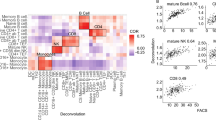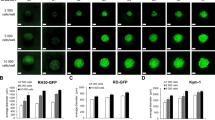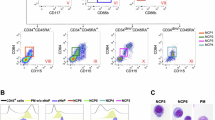Abstract
In previous studies bryostatin has been shown to cause dose-dependent stimulatory or inhibitory effects on colony formation in acute myeloid leukemias. In this study we investigated the inhibitory effect of high dose bryostatin-1 (bryo-1) on normal human bone marrow mononuclear cells (BMNC) colony- forming capacity. Preculturing BMNC for 24 h with 250 n M bryo-1 reduced colony formation by 66 ± 11% whereas this treatment did not reduce clonogenic capacity of highly purified CD34+ BMNC. When precultures with bryo-1 were performed in the presence of several cytokine neutralizing antibodies abrogation of the inhibitory effect could only be demonstrated by anti-TNFα. However, preculturing of BMNC or CD34+ cells with a wide range of TNFα concentrations as well as TNFα neutralization in supernatant of bryo-1-stimulated BMNC failed to affect the inhibitory effect on CD34+ cells. Both indicate that TNFα was not the only factor responsible for the inhibitory effect. Depletion of CD14+ cells from BMNC cultures showed that upon bryo-1 exposure the monocytes served as the main source of TNFα but not as a source of the inhibitory cytokine(s): in CD14+-depleted cultures the combination of exogenous added TNFα and bryo-1 resulted in an inhibition of colony formation comparable to that found in crude BMNC. In contrast, purified CD34+ cultures were not directly affected by bryo-1 and TNFα. However, clonogenic growth of purified CD34+ cells was inhibited if mononuclear cells were preincubated with TNFα alone for 24 h, and the supernatant of these cultures was used together with bryo-1. These results show that bryo-1-induced inhibition of clonogenic cell growth is not mediated by a direct effect of bryo-1 on CD34 cells but is a result of a process involving production of TNFα by CD14+ cells upon bryo-1 stimulation together with the induction of (a) secondary factor(s) by TNFα, which together with bryo-1 itself is inhibitory towards clonogenic cell growth.
This is a preview of subscription content, access via your institution
Access options
Subscribe to this journal
Receive 12 print issues and online access
$259.00 per year
only $21.58 per issue
Buy this article
- Purchase on SpringerLink
- Instant access to full article PDF
Prices may be subject to local taxes which are calculated during checkout
Similar content being viewed by others
Author information
Authors and Affiliations
Rights and permissions
About this article
Cite this article
Dräger, A., van der Hem, K., Zevenbergen, A. et al. Role of TNFα in bryostatin-induced inhibition of human hematopoiesis. Leukemia 13, 62–69 (1999). https://doi.org/10.1038/sj.leu.2401250
Received:
Accepted:
Published:
Issue date:
DOI: https://doi.org/10.1038/sj.leu.2401250
Keywords
This article is cited by
-
Effects of bryostatin-1 on chronic myeloid leukaemia-derived haematopoietic progenitors
British Journal of Cancer (1999)



